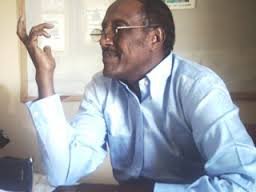By Liban Ahmad
Muuse Biihi, the chairman of Somaliland ruling party, Kulmiye, felt unwelcome while on visit in Las Anod last week. He said he had seen flags of the party “only in the front-line at Gambadhe”, where Somaliland forces are based and where he felt at home because “ I am happy where people I am related to are”. He might have been speaking of his past profession as a soldier. Mr Biihi was not warmly welcomed in Sool as he was in Bur’ao, Gar’adag and Erigavo. “Somaliland recognitiondepends on your presence here” he told Somaliland forces.

His remarks reminded me of the speech former Puntland President, Mohamud Muuse Hirsi, made at the coronation of Garaad Jama Garaad Ali in 2006. “Somaliland flag will never be hoisted in Las Anod”, he said. One year after that speech, his former Interior Minister, Ahmed Abdi Habsade, defected to Somaliland and facilitated the fall of Las Anod ( Habsade left Somaliland in 2014 to rejoin Puntland).
The campaign tour of Kulmiye chairman reflects how out of touch Somaliland leaders are with political realities in the Horn of Africa. The 2001 referendum administered by Somaliland was the legal argument used by Somaliland before capturing Las Anod. Somaliland views its ‘army’ as protector of political aspirations of people who want Somaliland to secede from Somalia. The referendum was held in 14 of Somaliland’s pre-1991 20 districts ( It did not take place in Las Anod, Huddun, Taleh, Buhotle, Badhan and Las Khorey).
Las Anod is comparable in size to one of large Mogadishu districts but the complexity of its politics is almost ¼ of southern Somalia politics. There are politicians and traditional leaders whose loyalties keep changing; Somaliland and Puntland are claiming Sool; a third, unrecognised administration, Khatumo, born of Puntland and Somaliland failures, claims to represent people in Las Anod, Huddun, Taleh and Buhotle.
Somaliland has been ruling Las Anod since October 2007. Somaliland administration has split Sool region into three regions : Sool, Haysimo and Saraar. It is only Saraar where aid workers can visit or undertake development work. Who is responsible for this conflict-induced underdevelopment? In a recent interview the Somaliland Minster for Public works, Abdiraisak Khalif, acknowledged that conflict in Sool has had an impact on development projects. The development embargo is still in place although Somaliland controls more than 70% of Sool. That is why Sool politicians are indifferent to selling the idea of Somaliland to their constituencies.
As the now late President of Somaliland, Mohamed Haji Ibrahim Egal, said in a 1997 speech, secession was declared in haste. The debate in ex-Italian Somalia is about federalism and a centralised government but in ex-British Somaliland it is about remaining part of and breaking away from Somalia. Is holding presidential and local elections a reason for undermining development rights of people in Sool? There can be no common political ground when an administration marginalizes people it wants to co-opt. Chairman Muuse Biihi has unwittingly made that point loud and clear.
Liban Ahmad
Email:libahm@icloud.com


Leave a Reply